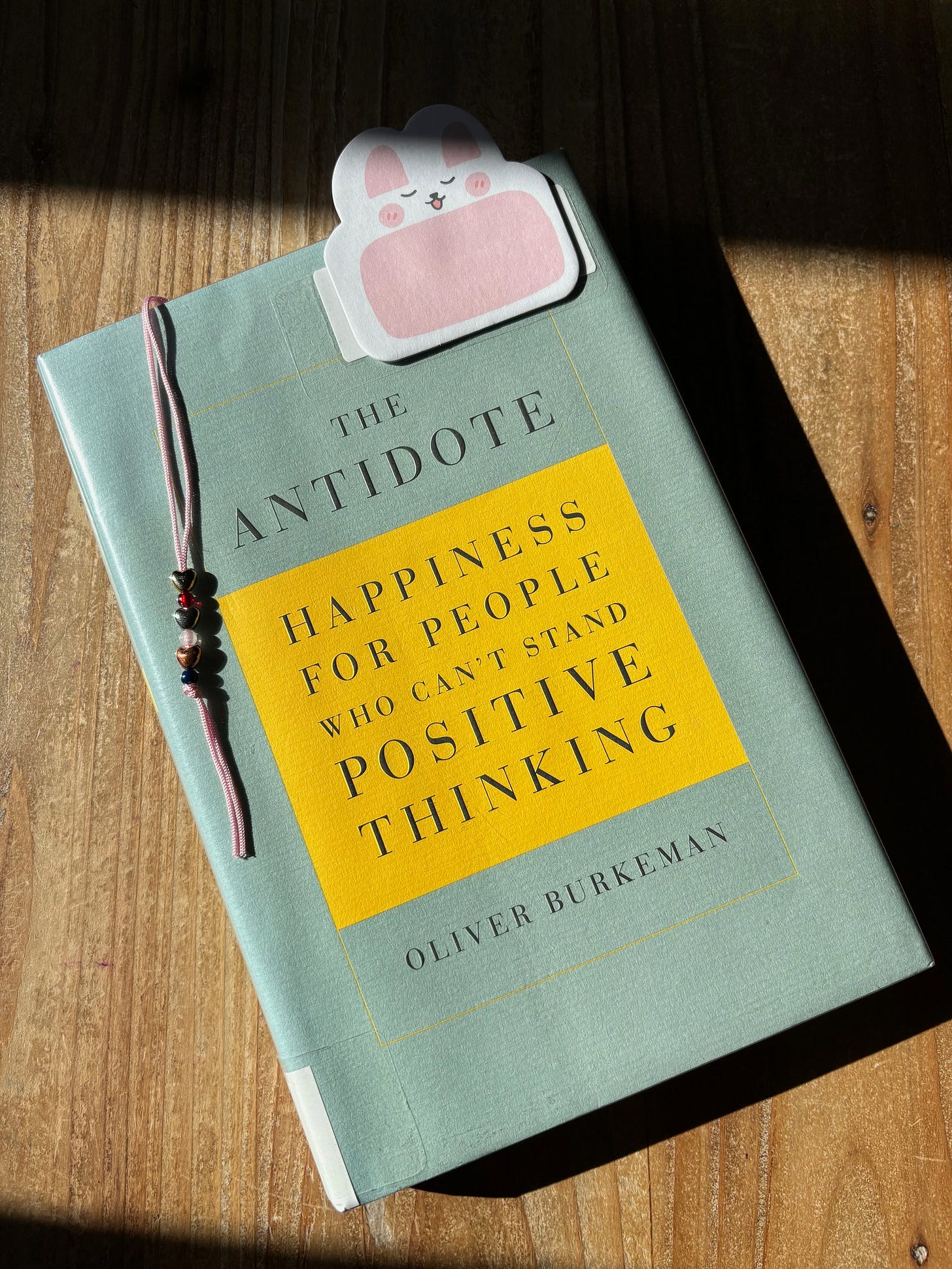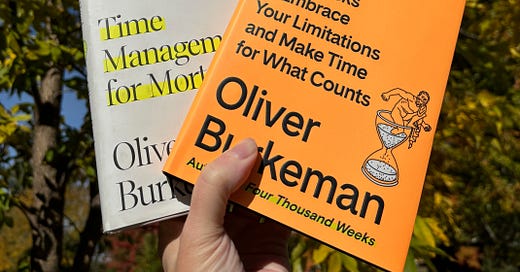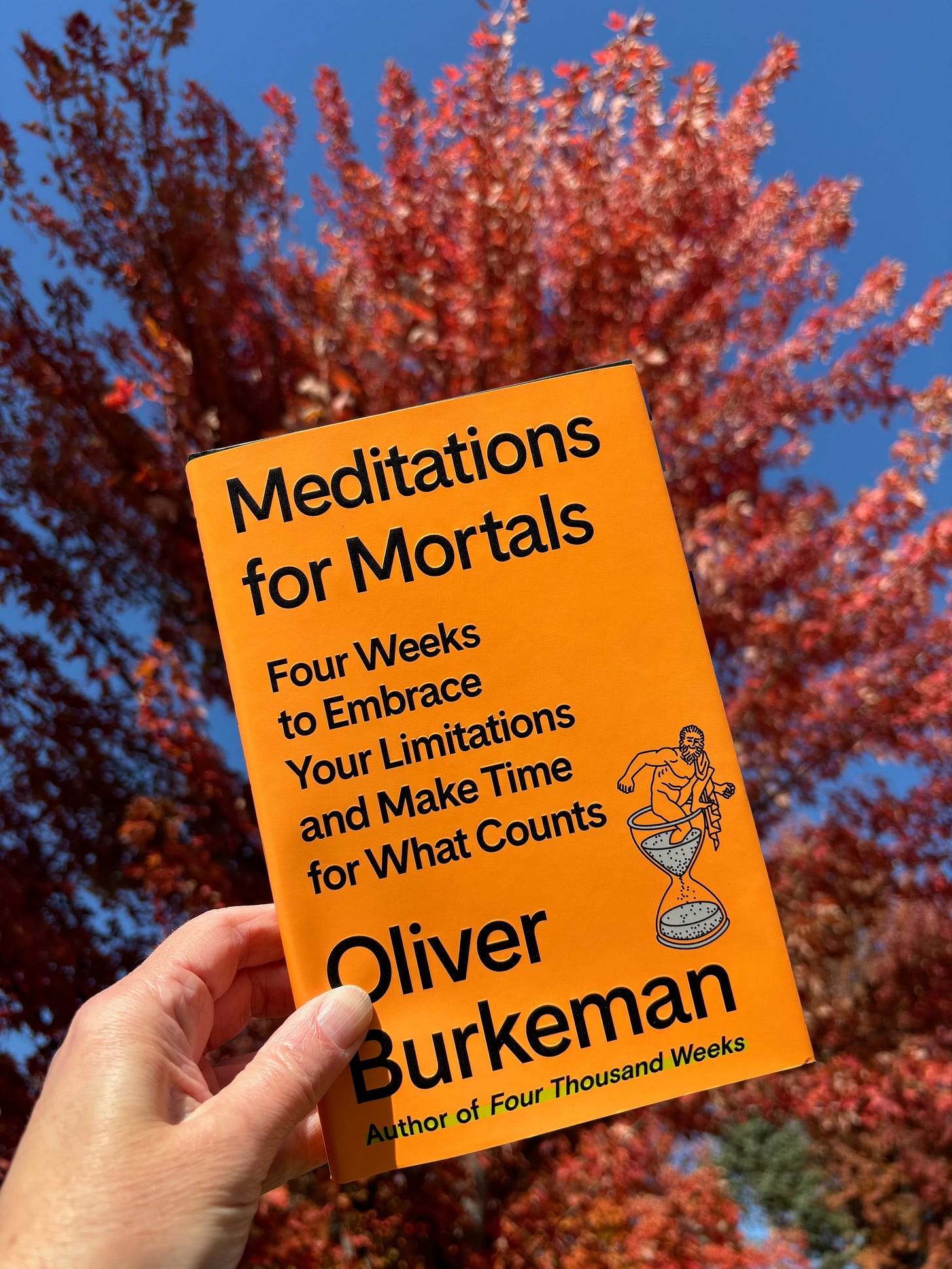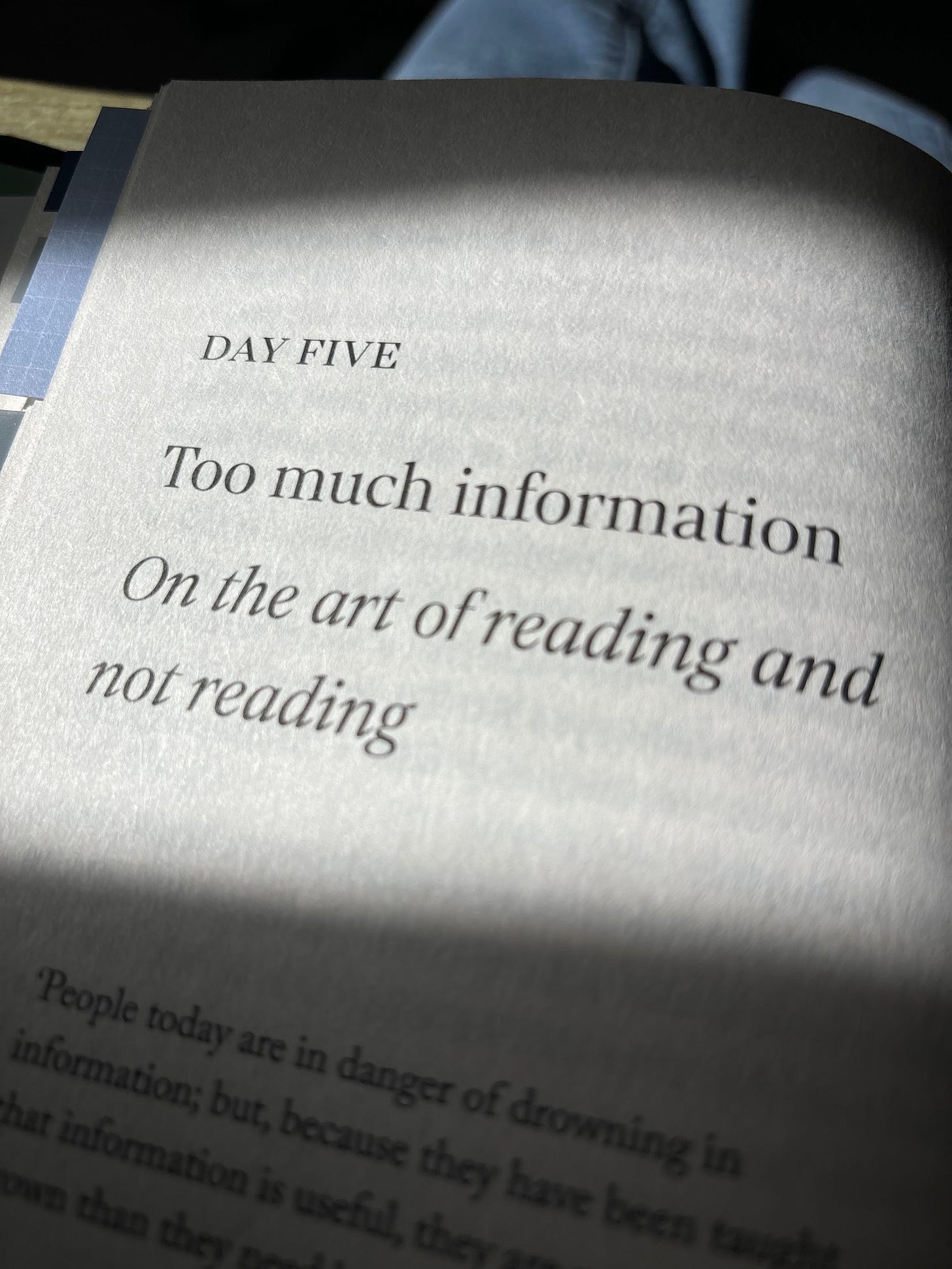Calling All Mortals: How Are You Spending Your Time?
Wondering if you need to read Oliver Burkeman's latest book over 28 days - or at all? Here are my thoughts.
What is it about Oliver Burkeman’s writing?
His 2021 book, Four Thousand Weeks, starts by reminding us that time is limited, we’re only here for a finite number of weeks, and we’ll never get to everything on our bucket lists.
The first entry of his brand-new book, Meditations For Mortals, is titled, ‘It’s worse than you think.’
His 2012 book is called The Antidote: Happiness For People Who Can’t Stand Positive Thinking.
I am a professional coach, with additional certifications in positive psychology and with core values like positivity and purpose, so it seems his views might go against everything I believe in, coach on, and teach.
Yet, Four Thousand Weeks made my top 10 list when I read it in 2022 and Meditations For Mortals is a clear frontrunner for my top 10 list this year, too. What gives?
An Alternate View Of Time Management
At first blush, Burkeman’s philosophies may seem counterintuitive, maybe even a bit defeatist. I mean, his very first line in Four Thousand Weeks is, ‘Introduction: In The Long Run, We’re All Dead.’ It just doesn’t scream ‘uplifting and affirming,’ does it?
And yet, I’d argue that’s exactly what it turns out to be.
I’ll get more into specifics in a moment, but overall, Burkeman’s view serves as both a calming presence (perhaps akin to Richard Carlson’s Don’t Sweat The Small Stuff) and a motivating call to decide - and to keep deciding - where we most want to spend our time.
Which I find unexpectedly refreshing at the moment. Many time management tips and tools seem to offer us one of two things: a) a one-size-fits-all list of steps that, if we just check off every single one every single day (otherwise you break your streak and fall off the leaderboard and have to start over, you know), you’ll win at life; or b) a ‘just relax, do nothing, let life happen’ approach that seems to assert we can’t both rest and strive toward goals in the same lifetime.
(OK, maybe this is a tad dramatic. But it certainly feels this way at times!)
Burkeman slips into a unique category somewhere in between. It’s not about the trophies, but it’s not about avoiding the race altogether, either. He offers no 10-step plan, no program to follow, no system to employ. Instead, he continually encourages us to pause, consider what makes life meaningful to us, and then suggests ways of thinking, questioning, and walking through the world that can help us live that out - both now and in the future.
“Few things are more appealing, when you’re hoping to change your life, than a new system for doing so,” Burkeman writes early in Meditations For Mortals. “But that allure can lead you astray. Almost nobody wants to hear the real answer to the question of how to spend more of your finite time doing things that matter to you, which involves no system. The answer is: you just do them.” (p. 9-10)
And in a book with fewer than 200 pages, he goes on to share a wealth of examples, possibilities, and considerations so we can each decide for ourselves what matters most and create our own path for making our time count. Even develop our own 10-step system, I suppose, if that’s what we feel compelled to do.
With his engaging writing style and calming perspective, what at first might seem bleak or defeatist actually proves positive, purposeful, and life-affirming. We can have goals and be ambitious and driven; and we can savor the moment and be grateful for each precious day as we live it.
In a sense, perhaps we can have our cake and eat it, too.
Meditations For Mortals: My Thoughts
Even though I loved Four Thousand Weeks, I was hesitantly curious about what kind of reading experience I’d have with Meditations For Mortals, primarily for two reasons:
First, I wondered if Meditations would offer anything that felt new - or if it might simply be a revisiting of Four Thousand Weeks. I read extensively on this topic, including several books just recently. And while I believe we can always benefit from reminders for honoring our time and living our lives meaningfully, I also didn’t want to read (or pay for) a repeat of an earlier book at the moment.
Second, I was unsure if the format would suit me. I have a book of daily devotionals that I love, so I’m not opposed to the ‘one essay per day’ (for 28 days, in the case of Meditations) idea, but outside of my already-existing daily practice, it’s not my preferred way to read a book.
Both concerns were completely unfounded. Burkeman’s unique voice makes this stand out in the vast sea of time management resources - and even from his own earlier works. And I read the entire thing within a 24-hour period, rather than a 28-day experience, still easily rating it five out of five stars.
Each of the 28 entries has its own title, many of which made me initially tense up a bit because they sounded so opposite to what I believe and how I operate. Each entry, however, ended up resonating with me upon further reading.
For example, Day 22’s entry is titled, ‘Stop being so kind to Future You.’ So much of what I do for a living is around vision and goals: I’m often encouraging my coaching clients to picture themselves at some point in the future, asking them to share what they’d be feeling and/or celebrating at that time, and then we create the action plan to get there. I’m quite familiar with, and a fan of, the popular (attribution unknown) saying, ‘Do something today that your future self will thank you for.’ So I wasn’t sure how I’d feel about this particular entry.
Spoiler alert: It’s one of my favorites of the whole book. Again, it’s not about stomping out any flicker of ambition or not bothering with goals and plans. But it’s also not about thinking that life begins only once we achieve the goal or fulfill the dream.
“We have to show up as fully as possible here, in the swim of things as they are,” Burkeman acknowledges. “None of that means you don’t get to harbor ambitious plans as well - about the things you’ll accomplish, the fortune you’ll accumulate, or the difference you’ll make to the world. Far from it. It means you get to pursue those goals and feel alive and absorbed while pursuing them, instead of postponing the aliveness to when or if they’re achieved.” (p. 122)
Maybe the ‘future you’ concept runs a bit counter to the ‘all we have is the present moment’ philosophy, but I don’t think so. We cannot predict the future, and we don’t know how many tomorrows we will have - very true. We do need to savor the present. At the same time, and as Burkeman expands on in Day 3, our choices have consequences - and those consequences will impact our future selves, and often others, too. We can’t necessarily focus only on what’s best for today without also considering the future. This can sometimes feel like a tricky balancing act, and I so appreciate how Burkeman addresses it all in Meditations For Mortals.
(Although, to be fair, I do believe you can still be kind to Future You. :-) And, also to be fair, it seems Burkeman probably believes this as well.)

In addition to not proclaiming to be the ultimate time solution in 10 easy steps, Meditations For Mortals offers many topics that initially seem almost unrelated to time management altogether - or at most, maybe ‘time adjacent.’ Upon further reading and reflection, however, we can connect the dots and see how they are directly related - and often refer to the sneaky ways time can slip by without us even realizing. For instance, he talks about how we may miss out on time spent connecting with others because of thinking we need to clean and prepare and make our home near-perfect first (Day 24). Or the time we spend worrying (Day 7), or waiting for ‘real’ life to begin (Day 21), or avoiding things we don’t particularly want to face (Day 11).
We know time is one of our most valuable resources. After reading Meditations, I feel even more motivated to be intentional - yet also more calm and relaxed - about mine.
Final Food For Thought
It’s funny: Although Burkeman clearly states how Meditations is not a list of to-do’s or a system to implement, I’m already feeling many of his points working their way into my mode of operating. I love his comment that, while some decisions deserve time and thought before taking action, he does not believe this is the case when it comes to generosity. He quotes meditation teacher Joseph Goldstein as saying, “In my experience, generosity never leads to remorse.” What a beautiful guiding principle in life!
His commentary around how we try to ‘hoard experiences’ and ‘collect memories’ really speaks to me, too. In Day 25 - ‘You can’t hoard life’ - he describes the spirit of the Japanese tea ceremony, which offers such a good reminder for life: “You can have a hundred tea ceremonies; you could even have all of them with the same people,” he writes. “But you can only have that ceremony, that cup of tea, once.”
I would recommend Meditations For Mortals to anyone who wants to explore their relationship with time, wishes to balance honoring the future while also savoring the now, or simply desires a reminder that you’re doing just fine, you’re not ‘behind,’ and there is no magic train to hop on and get to ‘the good life.’ You get to create it - and enjoy it - as you go.
And if anything I’ve shared here resonates with you, I’d recommend it to you, too.
I believe good companion reads for this would include Slow Productivity by Cal Newport, Tranquility by Tuesday by Laura Vanderkam, and First Things First by Stephen Covey, A. Roger Merrill, & Rebecca R. Merrill. In a slightly different way, I also think The Good Life by Robert Waldinger & Marc Schulz would pair nicely with this one.
I read this book just a week ago, and now, in rereading parts to write this article, I am already finding new and different notes standing out. This may become a book worthy of the occasional - or even annual - reread. It feels soothing and motivating all at once - such a unique balance for a personal growth book!
Have you read Meditations For Mortals yet? How about Four Thousand Weeks? Feel free to share your thoughts on either/both in the comments!
Questions? Comments? Books you’d like to suggest? Feel free to email me at readingandpurpose (at) gmail.com or comment on the post directly. You’re welcome to share this email with a friend - I hope they find it helpful and I appreciate the support!







Great notes on this, thank you for sharing!
This part reminded me of the short but well-researched work, Ichigo Ichie by Hector Garcia & Francesc Miralles: In Day 25 - ‘You can’t hoard life’ - he describes the spirit of the Japanese tea ceremony, which offers such a good reminder for life: “You can have a hundred tea ceremonies; you could even have all of them with the same people,” he writes. “But you can only have that ceremony, that cup of tea, once.”
It also goes with Heraclitus’ quote: No man ever steps in the same river twice; for it’s not the same river and he’s not the same man.
I like Oliver Burkeman’s work. I bought his “4000 Weeks” because of a chapter title “Cosmic Insignificance Therapy.”